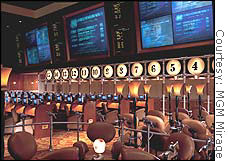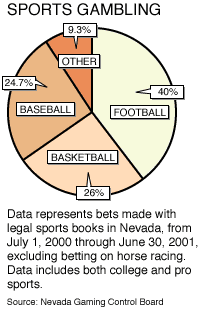
NEW YORK (CNN/Money) - Those who think that the St. Louis Rams lost last year's Super Bowl haven't talked to a bookmaker.
The nation's legal and illegal sports books both had their worst day ever because of the upset win by the New England Patriots.
The point spread on the game got very large, about 13 points. That meant the Patriots only had to lose by 12 points or less for those betting on the team to win. So a majority of bettors, by some estimates 60 percent, took the underdog in the game and came out on top.
 |
|
| Sports books, like this one in the MGM Mirage, have among the thinnest profit margins in a casino. |
This year's game was much more balanced, due to a much smaller point spread - about four points in favor the Oakland Raiders, who were also upset by the Tampa Bay Buccaneers. But it wasn't the same kind of upset for the bookmakers as a year ago.
The ideal for bookmakers is to have equal number of bettors taking both sides of a bet. Since the house only pays back $10 in winnings on a successful $11 bet, an equal split means that the bookmaker is assured of making money on that 10 percent premium paid by bettors. But the bookmaker is at risk for a loss when there's a large imbalance, like last year's Super Bowl.
"They really got creamed. The game was so obvious to (gamblers), they just could not produce a balanced book," said Eugene Christiansen of Christiansen Capital Advisors, a financial adviser to the legalized gambling industry.
Still, even last year's Super Bowl wipeout wasn't enough to show up on the casinos' bottom lines. Overall sports book betting comes to about $2 billion a year in Nevada, and only about 40 percent of that is on football throughout both the college and pro seasons. That means all of football betting is only about 13 percent of the amount pumped into slot machines, which produces far more winnings for the casinos.

Bookmaking on sports is the least profitable segment of the gambling industry, according to Christiansen and other gambling experts, with very thin margins and losses two months out of every 12 on average.
"The Nevada book, going back to 1982, has had profit margins that fluctuated from about 2.3 or 2.4 cents on a dollar to about 3.8 or 3.9 cents," said Christiansen. The floor space given to sports books could produce far more profits for the casino if it were given over to slot machines or blackjack tables, he said.
"On a revenue per square foot basis, the sports book is probably on par with the coffee shop," Christiansen said.
Still the Nevada's sports books makes sense for the casinos. The only legal sports gambling in the United States, the casinos operate their sports books as loss leaders. They draw visitors, especially as casinos without sports books spread to so many other states. And when they aren't in the sports books placing bets, many will be at the slots or blackjack tables where the odds and profit margins are far more in the house's favor.
Local bookmakers face tougher business
For the illegal bookmakers around the country, the business is even tougher because they don't have the other forms of gambling and hotel revenue streams to fall back on.
"If you're Bob Walker, the sports book operator for Mirage, you have a well capitalized company and you survive the experience," said Christiansen. "If you're an independent bookmaker, you can go bust. The typical career of many bookmakers -- they're a player for a while, then they're a bookmaker for a while, then they go broke."
One upstate New York bookie I talked to said the growth of offshore sports gambling on the Internet is putting a squeeze on him and other traditional bookmakers. Not only does he have to worry about losing business to the sites, but the sites also lets his customers become more sophisticated, which makes setting the local betting line more difficult.
"Years ago, you never even had a morning line in [the] newspaper," said the bookie. "The bettor would call and say, 'What's the line on this game or that game?' A bettor today has a line before we do."
| SportsBiz
|

|
|
|
|
Being able to set his own point spread is important for a local bookie's ability to keep his own book balanced. Local loyalties can skew that balance. The bookie I talked to said he had to have a much different line than Vegas during the years that the local favorite Buffalo Bills were in the Super Bowl. Fortunately for him, the Bills never won the game or even covered the spread.
That wasn't the case for many New England bookmakers last year. Boston papers reported many local bookies went bust due to the game. The hit to their reputation drove many out of the bookmaking business, and left the gamblers high and dry.
"The bookmaker sticks the customer," said the upstate New York bookie. "You have no recourse. The bettor can't go to police and say, 'The guy didn't pay me.' But word spreads like wildfire."

|

